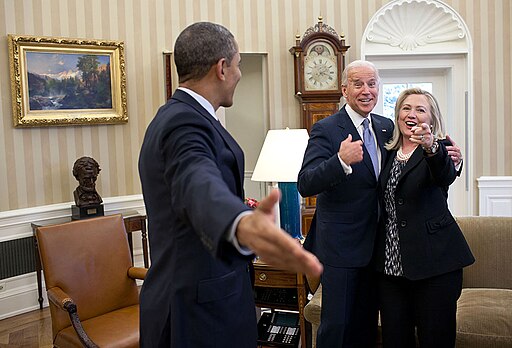
Beinart admits that Joe Biden’s son Hunter’s service as a very well-paid member on the board of a Ukrainian energy company at the same time his father’s portfolio included “fighting corruption in the Ukrainian energy industry” was “a problem.”
But it’s not Joe’s fault, see? His staffers didn’t want to confront him about the conflict of interest. They “feared the vice president’s wrath,” and thought him “too fragile” after one son’s death to hear “upsetting news” about the other’s conduct.
Ditto Hillary Clinton. As Secretary of State, she was briefed on (and signed papers agreeing to abide by) State Department protocols on the handling of classified information and the use of non-government email systems. But Beinart lets Clinton off the hook because her chief of staff and other aides failed to “forcefully convey” her obligations to her.
Here’s Beinart’s case — one also made by other Democratic partisans — boiled down to its essentials:
When Republicans act criminally and/or corruptly, it’s because they’re criminal and/or corrupt.
When Democrats act criminally and/or corruptly, it’s because they’re just poor, temperamental, out-of-their-element naifs who of course have no criminal or corrupt intent, but whose staffers — whether negligently, or out of concern for feelings or fear of offending — neglect to button their winter coats for them, take them by their little mittened hands, and carefully walk them across all those busy, dangerous legal/ethical streets.
There are two obvious problems with this double standard.
One is that for the last three years we’ve been told over and over (by, among others, Hillary Clinton and Joe Biden) that Trump is a loose cannon, an eternal man-child who lacks “adults in the room” to help him navigate the intricacies of governing. So why shouldn’t Trump receive the same “Blame the Aides and Get Out of Jail Free Card” that Beinart tries to play on behalf of the other two?
The other is that in arguing that Joe Biden and Hillary Clinton aren’t responsible for their actions because they’re too stupid to discern right from wrong and too simultaneously mean and emotionally delicate to be TOLD right from wrong, Beinart is necessarily also arguing that Joe Biden and Hillary Clinton were and are, by definition, unfit to entrust with responsibilities as weighty as those that go with, say, the presidency of the United States.
Thomas L. Knapp (Twitter: @thomaslknapp) is director and senior news analyst at the William Lloyd Garrison Center for Libertarian Advocacy Journalism (thegarrisoncenter.org). He lives and works in north central Florida.
PUBLICATION/CITATION HISTORY


